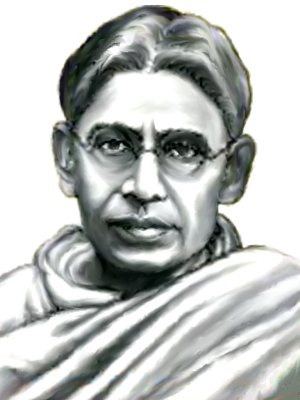 Maramalai Adigal (15 July, 1876 - 15 September, 1950) was an eminent Tamil orator as well as a writer. He was born to Cokkanata Pillai and Cinnammai. His birth name was Vedhachalam. Initially he did his schooling from Wesley Mission High School in Nagappattinam. However after his father`s death he had to stop his studies.
Maramalai Adigal (15 July, 1876 - 15 September, 1950) was an eminent Tamil orator as well as a writer. He was born to Cokkanata Pillai and Cinnammai. His birth name was Vedhachalam. Initially he did his schooling from Wesley Mission High School in Nagappattinam. However after his father`s death he had to stop his studies.
Maraimalai Adigal discontinued his formal education after 9th grade. He composed more than 100 books. This includes works on original poems and dramas. His literary works are based on Shaivism. He also founded a Shaivite institution called Podhunilaik Kazhagam. He supported the Pure Tamil movement. He is considered as the father of Tamil puritanism. He promoted the use of Tamil devoid of Sanskrit words and thereby changed his birth name Vedhachalam to Maraimalai.
He was inclined towards non-Brahminism. The atheist ideologies were shunned by Maraimalai Adigal. He continued learning Tamil language from Tamil scholar Narayana Pillai. He wrote several articles in Tamil monthly called Neelalochani. He also studied Shaiva Philosophy under Somasundara Naiker. He also learned poetic dramas with the help of Sundaram Pillai.m
He got married to Soundaravalli and moved to Chennai to work as a sub-editor for a journal Siddantha Deepikai. Thereafter he worked as a teacher in Madras Christian College. During this time he toured throughout Tamil Nadu giving lectures on Shaivism. He started a society for Shaivism called Saiva Siddhanta Maha Samajam.
Later Maraimalai Adigal resigned his Christian College job to lead an ascetic life in a serene atmosphere outside the city and did further research in Tamil. He wrote books that dealt with literary criticism, philosophy and religion, history, psychology and politics. His wrote several poems that were dedicated to Hindu god Murugan, which he composed during the times of illness. They were published as Thiruvotri Muruhar Mummanikkovai in 1900. He wrote poems in memory of his teacher Somasundara Naiker in 1901 as Somasundarak Kaanjiaakkam. This has been considered as one of his best works. He released his research work on Tamil literature called Mullaip Pattu Aaraichi for students of Tamil literature. He also translated Kalidasa`s Sakuntala into Tamil.
Some of his well known works include:
* Pattinapalaai Aaraaichi-yurai (1906)
* Tamizhthaai (1933)
* Sinthanaikatturaikal (1908)
* Arivuraikkothu (1921)
* Chiruvarkaana Senthamizh (1934)
* Ilainarkaana Inramizh (1957 - posthumous publication)
* Arivuraikkovai (1971 - posthumous publication)
* Maraimalaiyatikal paamanaikkovai (1977 - posthumous publication)
His first novel was published in 1911, Kumuthavalli allathu
Naahanaattarasi which is an adaptation of English novel Leela by G. W. M. Reynolds.
He was the first and foremost author of self-improvement development books in India. The following book were authored by him: Maranathin pin Manithar Nilai (Human Life stage After Death), Mesmerism and Hypnotism, Tholaivil unarthal (Telepathy)
Maraimalai Adigal he moved to Pallavaram, a Chennai suburb, after quitting his college job. He started to dress as a Sanyasin and came to be known as Swami Vedhachalam. He started an institution named Podhunilaik Kazhagam. A monthly named Gnaana Saaharam was started by him. He is referred to as the Father of Tamil Puritanism. He is also considered as father of Non-Brahmin Tamil movements. He also penned several wrote a series on the Ramayana in Periyar`s English language weekly Revolt.



















